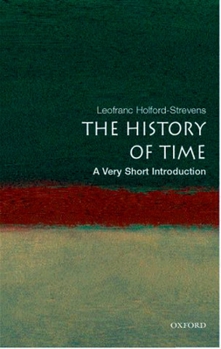The History of Time: A Very Short Introduction
(Part of the Oxford's Very Short Introductions series Series and Very Short Introductions (#133) Series)
Select Format
Select Condition 
Book Overview
Why do we measure time in the way that we do? Why is a week seven days long? At what point did minutes and seconds come into being? Why are some calendars lunar and some solar?
The organization of time into hours, days, months, and years seems immutable and universal, but is actually far more artificial than most people realize. For example, the French Revolution resulted in a restructuring of the French calendar, and the Soviet Union experimented with five and then six-day weeks.
Leofranc Holford-Strevens brings us this fascinating study of time using a range of examples from Ancient Rome and Julius Caesar's imposition of the Leap Year to the 1920's project for a fixed Easter. Those interested in time, history, and the development of the calendar will enjoy this absorbing exploration of an aspect of our lives that we all take for granted.
The organization of time into hours, days, months, and years seems immutable and universal, but is actually far more artificial than most people realize. For example, the French Revolution resulted in a restructuring of the French calendar, and the Soviet Union experimented with five and then six-day weeks.
Leofranc Holford-Strevens brings us this fascinating study of time using a range of examples from Ancient Rome and Julius Caesar's imposition of the Leap Year to the 1920's project for a fixed Easter. Those interested in time, history, and the development of the calendar will enjoy this absorbing exploration of an aspect of our lives that we all take for granted.
Format:Paperback
Language:English
ISBN:0192804995
ISBN13:9780192804990
Release Date:October 2005
Publisher:Oxford University Press
Length:160 Pages
Weight:0.35 lbs.
Dimensions:0.4" x 4.4" x 6.9"
Customer Reviews
1 rating
Time is an ideological invention
Published by Thriftbooks.com User , 17 years ago
The first interest of the book is that it collects the essential data about how time is measured by human beings. Even if the author shows the main two methods : lunar and solar calendars, and the hybrid third solution, he shows that measuring time was never a purely temporal objective. It did not try to establish some absolutely material count of time or dating, because that was impossible, because the lunar cycle or the solar cycle are not absolutely regular, just the same as the earth's cycle. The author shows that dating was always dominated, determined by some necessities in society: the crops, the various rites and rituals, hence religion and many others, including of course political and ideological contingencies. This leads us to the obvious conclusion that time is not a natural category or concept. It is human. Time is not invented by man in its flowing always changing phenomena connected to the universal, be they cyclical like days, lunar months, solar months, seasons, years, or be they accidental like a natural catastrophe for one example. But time is nothing but a human invention in the seriating it implies that enables human beings to measure their activities and their history. History only concerns human beings, not plants nor animals. And if we can write the history of a plant or even a rock, it is because we project our own vision of time into the plant and the rock. History is also a human invention within the desire of and the need for human beings to remember, understand, plan and foresee its various activities on various scales. The best example is the week. The old (Roman and Babylonian) eight day system, then the 7 day system after the seven planets of the solar system including Venus (known by some as the morning star, the "star" behind Horus for an Egyptian example) and the moon ( the satellite of the earth). But the attempts at having other weeks are funny and yet very clear. The French Revolution and its ten day decades got rid of Sunday as one rest day out of seven to replace it by one day of rest every ten days. If you add to that the banning of religious festivities, particularly the Nativity week, the Passion week and the Assumption week, you have a real regressive social policy there. On the other hand the replacing in 1929 of the seven day week by a five day week by Stalin with one day of rest every five days (instead of one every seven days), but that day of rest was rotated among workers divided in five fifths according to their resting day is progressive on the amount of rest and regressive on the level of family life and even social life. This reform was quickly modified to a set and common day of rest for everyone but this time once every six days in 1931, to be finally restored on the basis of a seven day week in 1941. We can see in such schemes anti-religious intentions but also economic intentions to make people work more (for the French Revolution) or less (for the Soviet Union's first and even second ref





